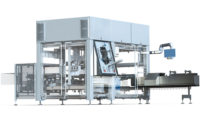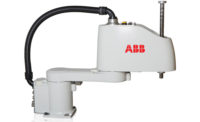Materials Technology: Films
Today's films protect the product and the environment
In the forefront of consumer minds, films are claiming their space to offer protection, recyclability and convenience.

Toray Plastics’ new RipStop OPP film is made for corrugated/paperboard box handle reinforcement tape applications.

Ultra high-barrier films by Cosmo Films protect dry foods, snack foods and more.

Propafilm by Innovia Films provides product protection for Yorkshire Tea.



Advancements in films – for nearly all types of packaging – continue to prove we are only touching the surface of these dominant materials. Nowadays, consumers as well as retailers pay more attention to packaging that keeps products safe, including films, when making their purchasing decision.
Designed for the corrugated/paperboard category, Toray Plastics America (toraytpa.com) has revolutionized the adhesive/tape area of box handles with its Torayfan® RS03 RipStop film. This new high-tensile-strength polypropylene-based film is designed for box-reinforcement tape applications.
The tapes are made to reinforce die-cut box handles and can be integrated into the sides of corrugated and paperboard boxes. According to Toray Plastics, the RS03 film exhibits excellent tear resistance in the transverse direction (TD or cross-machine) and high tensile-strength in the machine direction (MD).
RS03 weighs less than fiberglass and polyester filament materials, so less material is needed for producing tape. When RS03 is integrated into the sides of boxes, that reinforcement may allow end users to transition to a box with a lower total board weight.
Films offer longer shelf life, convenience
According to a recent report by Smithers Pira (smitherspira.com), the global high-barrier packaging film market is expected to grow at annual rate of 4.7% to 2021, with a U.S. $11.32 billion value, driven by convenience and product safety concerns.
That’s good news for Cosmo Films (cosmofilms.com), as the company has recently added to its range of transparent and metalized barrier films with its new ultra high-barrier films (UHB), offered in both categories. These solvent-free coated films used for a wide range of fast moving consumer goods (FMCG) packaging applications not only help in extending the shelf life of the contents inside, but also help with pack structure rationalization.
Under transparency, the UHB films offer excellent moisture, aroma and gas barrier properties with OTR<1 cc and are used to convert three-layer laminates into two layers for packaging of aromatic and fat content-rich products like dry fruits, nuts, spices and the like. According to Cosmo Films, they also offer mineral oil resistance.
Innovia Films (innoviafilms.com) uses a proprietary “bubble” manufacturing process for its Biaxially Oriented Polypropylene (BOPP) Propafilm™. Yorkshire Tea, one of Taylors of Harrogate’s iconic brands and one of the best-selling teas in the U.K., uses Propafilm to protect its “big flavor.”
The Propafilm range includes glossy films to enhance shelf appeal, shrink tightening films for pack appearance, high barrier films for product protection, easy-open films and clear collation films for multi-pack applications. Besides tea overwrap, Propafilm is used in biscuits and dried foods, confectionery, home, and personal care and cosmetics.
Made with the future in mind
One certainty in packaging is that consumers demand more in terms of environmentally responsible packaging. Here, we have two films that are making strides in that category.
Responding to customer demand for more sustainable flexible packaging materials, Charter NEX Films (charterNEX.com) has launched GreenArrow Recyclable Films. The GreenArrow line includes a 100% PE film for surface-printed pouch applications and a multi-layer film using RecycleReady technology.
GreenArrow films include stand-alone films, print films for laminations and sealant films for laminations. They offer the same convenience and functionality as multiple material structures, but have the added benefit of recyclability. These multi-layer films meet the content requirements for the How2Recycle “Store Drop-Off” label, and can be recycled wherever PE film recycling streams are available.
For products requiring barrier properties, films with oxygen and moisture barriers are available. Charter NEX offers other sustainable film options including starch-based films, starch-filled films and post-consumer recycled resin films.
German confectionery Mimi’s Garden turned to Futamura (futamuracellulose.com), a Japanese manufacturer of cellulose and polymeric films, and its award-winning NatureFlex™ compostable film for a new range of organic, vegan energy treats.
The confectionery chose NatureFlex as it complements the company’s ethical values: being made from independently FSCTM- or PEFCTM-certified, renewable and home compostable cellulose (wood pulp), while offering excellent barrier protection against mineral oil (MOSH/MOAH), aroma and moisture.
The NatureFlex range uses novel heat seal-resins on each side. They are static free and offer a wide heat-seal range for outstanding machine performance. The films offer good gas barrier properties and the coatings can be tailored to provide varying degrees of moisture barrier, depending on the needs of the wrapped product.
While films most often touch the product they protect, manufacturers are on the front line of making sure the material protects the product, the consumer and ever more, the environment. With films becoming more flexible, more protective and more environmentally friendly, we can’t help but wonder what comes next.
THE FUTURE OF FILMS & THE INDUSTRYAccording to Chris Voght, senior director of sales and marketing at Toray Plastics’ Torayfan® division, there are many factors influencing the future of films and the industry, including these five trends:
|
Looking for a reprint of this article?
From high-res PDFs to custom plaques, order your copy today!









